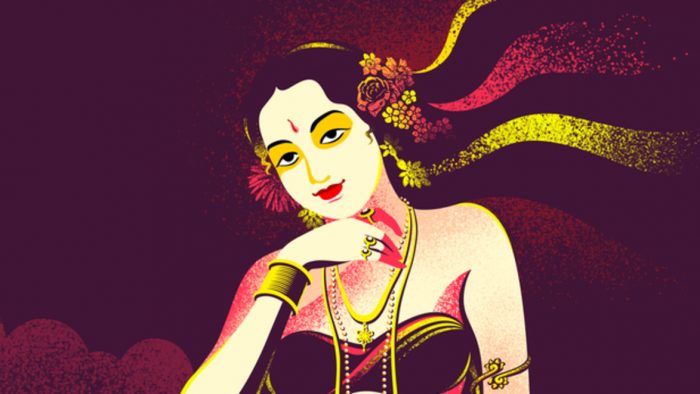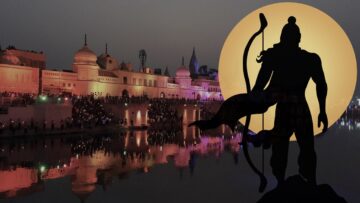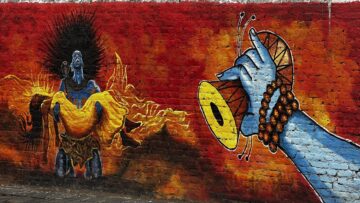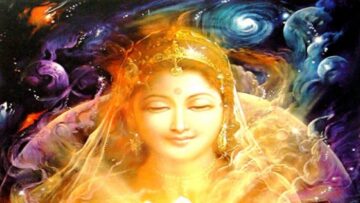The Vishnu Purana mentions the Samudra Manthan and the emergence of many beautiful things including the vibrant and beautiful Goddess Lakshmi. It is also believed that from the churning of the milky ocean arose some striking Apsaras. On her arrival, Goddess Lakhsmi is greeted with the utterance of the Shri Sukta.
A congregation of the celestial Apsaras led by the most beautiful Apsara Ghritachi danced and welcomed her. Apsara Ghritachi was one nymph who was a reason for the birth of many virtuous children. Apsara Ghritachi has her mention as a mother to many children in both the Ramayana and the Mahabharata.
Apsara Ghritachi and the Puru Dynasty
Apsara Ghritachi had an important role in the expansion of the Puru dynasty. The son of Pūru was Janamejaya, and his son was Pracinvān. The sons and grandsons in the line of Pracinvān were Pravīra, Manusyu, Cārupada, Sudyu, Bahugava, Saṁyāti, Ahaṁyāti, and Raudrāśva. Apsara Ghritachi mothered the ten sons to Raudrāśva and furthered the Puru lineage.
ऋतेयुस् तस्य कक्षेयुः
स्थण्डिलेयुः कृतेयुकः
जलेयुः सन्नतेयुश् च
धर्म-सत्य-व्रतेयवः
दशैते ऽप्सरसः पुत्रा
वनेयुश् चावमः स्मृतः
घृताच्याम् इन्द्रियाणीव
मुख्यस्य जगद्-आत्मनः
ṛteyus tasya kakṣeyuḥ
sthaṇḍileyuḥ kṛteyukaḥ
jaleyuḥ sannateyuś ca
dharma-satya-vrateyavaḥ
daśaite ’psarasaḥ putrā
vaneyuś cāvamaḥ smṛtaḥ
ghṛtācyām indriyāṇīva
mukhyasya jagad-ātmanaḥ
– Śrīmad Bhāgavatam, 9.20.4-5
Meaning: Raudrāśva had ten sons, named Ṛteyu, Kakṣeyu, Sthaṇḍileyu, Kṛteyuka, Jaleyu, Sannateyu, Dharmeyu, Satyeyu, Vrateyu, and Vaneyu. Of these ten sons, Vaneyu was the youngest. As the ten senses, which are products of the universal life, and act under the control of life, these ten sons of Raudrāśva acted under the total control of Raudrāśva. All of them were born of the Apsarā named Ghṛtācī.
Out of the Raudrāśva’s ten sons—Ṛteyu, Kakṣeyu, Sthaṇḍileyu, Kṛteyuka, Jaleyu, Sannateyu, Dharmeyu, Satyeyu, Vrateyu, and Vaneyu. The son of Ṛteyu was Rantināva. The son of Rantināva named Sumati had a son named Rebhi, and his son was Duṣhmanta
Apsara Ghritachi and the Bhrigu Dynasty
Apsara Ghritachi the celestial beauty was also instrumental in taking the dynasty of Bhrigu Muni further. Bhrigu Muni had a son by the name Chyavana. Chyavana had a son by the name Pramati. Apsara Ghritachi and Pramati became parents to Ruru’s.
भृगॊः सुदयितः पुत्रश चयवनॊ नाम भार्गवः
चयवनस्यापि दायादः परमतिर नाम धार्मिकः
परमतेर अप्य अभूत पुत्रॊ घृताच्यां रुरुर इत्य उत
रुरॊर अपि सुतॊ जज्ञे शुनकॊ वेदपारगः
परमद्वरायां धर्मात्मा तव पूर्वपितामहात
bhṛga sudayitaḥ putraśa cayavana nāma bhārgavaḥ
cayavanasyāpi dāyādaḥ paramatira nāma dhārmikaḥ
paramatera apya abhūta putra ghṛtācyāṃ rurura itya uta
rurara api suta jajñe śunaka vedapāragaḥ
paramadvarāyāṃ dharmātmā tava pūrvapitāmahāta
– The Mahabharata Adiparva Chapter 5 Verse 7
Meaning: The great and blessed saint Bhrigu, we are informed, was produced by the self-existing Brahma from the fire at the sacrifice of Varuna. And Bhrigu had a son, named Chyavana, whom he dearly loved. And to Chyavana was born a virtuous son called Pramati. And Pramati had a son named Ruru by Ghritachi, the celestial Apsara.
To Ruru also by his wife Pramadvara, was born a son, whose name was Sunaka. He was, Saunaka, thy great ancestor exceedingly virtuous in his ways. He was devoted to asceticism, of great reputation, proficient in law, and eminent among those having a knowledge of the Vedas. He was virtuous, truthful, and of well-regulated fare.
Apsara Ghritachi and the Amavasu Dynasty
The Ramayana has a mention of Kushanabha of the Amavasu / Kusha dynasty and his love for Ghritachi. Kushanabha was enchanted by the beauty of a gorgeous celestial maiden, Apsara Ghṛitachi, he fell in love with Apsara Ghṛitachi and married her. Out of matrimony with Apsara Ghṛitachi he became father to hundred beautiful daughters.
कुशनाभस्तु राजर्षि: कन्याशतमनुत्तमम्।
जनयामास धर्मात्मा घृताच्यां रघुनन्दन।। १-३२-११।।
Kushanabhastu Rajarshi: Kanyashtamanuttamam.
Janmayas Dharmatha Ghritaichya Raghunandan. 1 – 32 – 11.
– Valmiki Ramayana, Bala Kanda
Meaning: Oh! Successor of the Raghu family, the virtuous rajarshi Kusanabha begot one hundred beautiful daughters through a nymph named Ghritachi.
After having hundred daughters, King Kushanabha desired for a son. He started the Putrakameshti Yagna , in order to beget a son. During the performance of the ritual, Kusha, the brainchild of Brahma and the father of Kushanaabha, spoke to his son king Kushanaabha and said the lines below-
पुत्रह् ते सद्रिशह् पुत्र भविस्यति सुधार्मिकह् ।
गाधिम् प्राप्स्यसि तेन त्वम् कीर्तिम् लोके च शाश्वतीम् ।। १-३४-३
putrah te sadrishah putra bhavisyati sudhaarmikah |
gaadhim praapsyasi tena tvam kiirtim loke ca shaashvatiim ||1-34-3
– Valmiki Ramayana, Bala Kanda
Meaning: Oh son! There will be a highly virtuous and identical son of yours, known as Gaadhi, and through him you also will get everlasting renown in the world, thus Kusha said to Kushanaabha.
Kush Muni’s prophecy was fulfilled and soon King Kushanabha and Apsara Ghritachi parented a virtuous son named Gaadhi. King Gaadhi became the father of Maharshi Vishwamitra.
Apsara Ghritachi the mother of Nala
The Puranas have a mention of Viswakarma being turned into a monkey by Muni Ritdhwaj for abandoning his own daughter Chitrangada and restricting her from marital bliss. Once the monkey incarnate Viswakarma untied the knots of Jaabali who had been tied to a Banyan tree for years. Muni Ritdhwaj was pleased with the monkey’s deed and desired to grant him a wish.
The monkey was happy with Ritdhwaj Muni’s grace and said “Oh great Muni Ritdhwaj ! I am Chitranagada’s father whom you had cursed to become a monkey. Bless me that I become liberated from all my sins and regain my humanly form.” Ritdhwaj blessed the monkey to procreate a child from Apsara Ghritachi and be liberated thereafter from the curse.
In due course of time, Apsara Ghritachi became aware of the monkey’s real identity and developed physical intimacy with him. After ten months, she gave birth to a son and on that same day, Viswakarma was liberated from the curse and regained his human body. Apsara Ghritachi and Viswakarma had a son Nala. Virtuous Nala is credited as the architect of the Rama Setu- the floating bridge, which took Shri Ram’s Vanar sena across the ocean to Ravan’s Lanka.
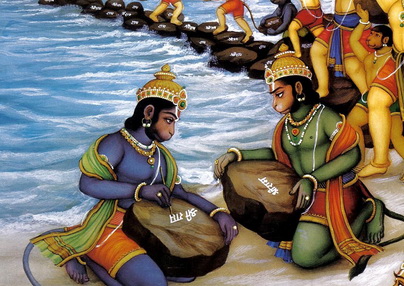
धनदस्य सुतश्श्रीमान् वानरो गन्धमादन:।
विश्वकर्मात्वजनयन्नलं नाम महाहरिम्॥१.१७.११॥
dhanadasya sutaśśrīmān vānaro gandhamādana:|
viśvakarmātvajanayannalaṃ nāma mahāharim||
– Valmiki Ramayana, Bala Kanda
Meaning: Kubera begot glorious Gandhamadana and Viswakarma begot a great monkey Nala.
The Puranas also have a mention of Apsara Ghritachi, and Viswakarma of being cursed, due to which both took birth as humans on Earth. Viswakarma was born as a Brahmin and Apsara Ghritachi took birth as a cowherd girl.
Together they became parents to five sons named- Manu, Maya, Tweshta, Shilpi, and Devagya. These five sons are said to be responsible for expanding the clan of professionals as goldsmith, carpenters, Iron blacksmiths, stone artisans, and bronze-smiths.
Apsara Ghritachi and the birth of Maharishi Shukadeva
Once Vyasa Muni had the desire to beget a boy child but he had no intention of getting entangled in the bond of marriage. He conveyed his desire to Devrishi Narada who advised him to pray to Devi Bhagwati, the prime cause and energy of creation.
Vyasa Muni proceeded to Mount Meru and settled in deep meditation praying to Devi Bhagawati to grant him a son. Subsequently after many years of penance, Vyasa was granted a boon by the Devi through her consort Lord Shiva. Sage Vyasa was happy with the boon of fathering a son but the confusion of begetting a son without matrimonial engagement was bothering him.
The beautiful Apsara Ghritachi while descending to Earth from heaven caught the eyes of Vyasa. He at once got attracted towards the beautiful Apsara Ghritachi while he was engaged in performing a Yagna. Upon seeing the beautiful Apsara Ghritachi, Maharishi Vyasa could not hold his desire for the gorgeous Apsara and was aroused. He set free his semen to fall on the twigs meant for the ignition of the holy Yagna.
The moment Rishi Vyasa was over with the release, Apsara Ghritachi was frightened of attracting a curse from Vyasa and decided to flee the place. With her magical powers, Apsara Ghritachi transformed herself from a beautiful woman to a Shuka – a parrot and flew off from that place.
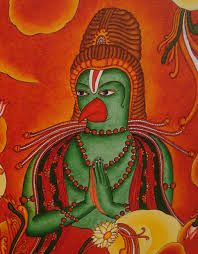
The fallen semen of Vyasa on the Yagna twigs caused the birth of Maharishi Shukadeva. Thus, Apsara Ghritachi is considered a reason for the birth of the great son of Maharishi Vyasa and also a rationale for fulfilling his desire of becoming a parent.
Apsara Ghritachi and the birth of Acharya Drona
The birth of the great guru of the Pandavas and the Kauravas- Dronacharya is also attributed to Apsara Ghritachi. As described in Mahabharat’s Adi Parva, once when Maharishi Bharadwaj was observing strict penance near river Ganga he would often visit the river to perform rituals. Once when he was offering his prayers he saw the beautiful Apsara Ghritachi bathing in the river Ganga.
Seeing the gorgeous Ghritachi bathing bare, Maharishi Bharadwaj was heightened with lust and he released his fluid. He collected the sperm in an urn known as Drona in Sanskrit. After a few months, a child emerged from the urn and was named Drona. Thus Apsara Ghritachi was in some way responsible for the birth of Drona.
The celestial Apsaras were created to perfection with a compelling draw of instant attraction, having the captivating influence of fascinating the onlooker. Besides extraordinary infatuating capacities, these celestial aqua maidens were also endowed with maternal love and were mothers to many important characters depicted in the Hindu scriptures.
Explore Apsaras series Part I, II, III, IV, V, VI, VII, VIII, and IX
Featured Image Credits: Dribbble by Mithun Mitra
Disclaimer: The opinions expressed in this article belong to the author. Indic Today is neither responsible nor liable for the accuracy, completeness, suitability, or validity of any information in the article.

